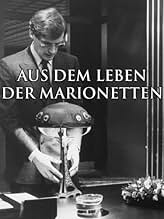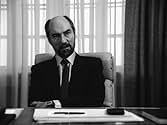IMDb RATING
7.2/10
5K
YOUR RATING
An account of the events before and after a murder committed by a disturbed businessman in a strained marriage, and what led him to perform such a shocking act.An account of the events before and after a murder committed by a disturbed businessman in a strained marriage, and what led him to perform such a shocking act.An account of the events before and after a murder committed by a disturbed businessman in a strained marriage, and what led him to perform such a shocking act.
- Awards
- 1 win total
Paul Bürks
- The Assistant in the fashion show
- (uncredited)
- Director
- Writer
- All cast & crew
- Production, box office & more at IMDbPro
Featured reviews
Bergman made this film in Germany, while in exile from Sweden for tax-related reasons. It's a dark and disturbing psychological portrait of a man, Peter, who murders a prostitute in the opening scene. The film moves back and forth in time, using title cards to establish the setting in time, trying to explain Peter's troubles. It's reminiscent of Scenes from a Marriage, as Peter has problems relating to his wife, Katarina. A few weeks before the murder, he started having fantasies and dreams about murdering her. The prologue, depicting the murder (or, more precisely, the moments before the murder) and the epilogue (Peter in prison) are filmed in color, but everything else is in black and white. The composition is generally not showy, but there is an amazingly filmed dream sequence, the film's centerpiece. The script is generally brilliant, very observant. The only thing I felt was a little underdeveloped was the homosexual character, Tim, and Peter's supposed latent homosexuality, which the psychoanalyst character describes near the end. I wasn't quite sure what to make of that material. 9/10.
A short comment - enjoyed this and it is up to the usual Bergmann standards. As with many of his other films sticking with some of the difficult opening scenes rewards the viewer later with a thought provoking account of one man's depression leading to violence and murder. In many ways Bergman is the jacques costeau of the film world, exploring the deep seas and bringing up to the surface what lies below!
This is totally engaging but its almost just theater: the long scenes, still camera, monologues, exposition of internal psycho-drama and chapters that structure the entire film.
But most of all its the interest and compassion contained in the human face and voice that Bergman makes central. That had been part of Bergman's work for a long time, just look at "Through a Glass Darkly". The characters are moving through space but not able to connect with each other at all, they simulate free will but they are not able to live it.
Having said all of the above the photography and set ups are occasionally sublime, the sort of thing that was the essence of cinema, but not so any more.
But most of all its the interest and compassion contained in the human face and voice that Bergman makes central. That had been part of Bergman's work for a long time, just look at "Through a Glass Darkly". The characters are moving through space but not able to connect with each other at all, they simulate free will but they are not able to live it.
Having said all of the above the photography and set ups are occasionally sublime, the sort of thing that was the essence of cinema, but not so any more.
Bergman's working with a very restricted palette here, as he did with The Rite or Winter Light. The romantic, funny touches you expect from him are missing. Peter's mind is crumbling; he's a modern Othello obsessed with his wife's fidelity amid the tasteful furniture of their elegant home. All the action is seen through the distorting lens of Peter's madness. Why would his wife say, in front of strangers, that she has to get drunk to steady her nerves at her mother-in-law's place? This is the disturbed mind at work.
The acting is fine. Robert Atzorn and Walter Schmidinger do very well as, essentially, two sides of the same coin (the stodgy businessman and the gay fashion designer). Christina Buchegger is wonderful as Katharina, the wife; her attempts to win out over Peter's psychosis give the film what drama it has.
The acting is fine. Robert Atzorn and Walter Schmidinger do very well as, essentially, two sides of the same coin (the stodgy businessman and the gay fashion designer). Christina Buchegger is wonderful as Katharina, the wife; her attempts to win out over Peter's psychosis give the film what drama it has.
Perhaps I'm biased as I am a great admirer of Ingmar Bergman, but I found myself both fascinated and impressed by From the Life of the Marionettes. Excepting All These Women, the only film(of those I've seen, which is a little over two-thirds) that I didn't care for, Bergman's films have ranged to solid to outstanding. From the Life of the Marionettes is not one his very finest, but it is one of the films of his that is close to outstanding. Apart from the I agree underdeveloped homosexual subplot, there is very little of the film to criticise. The production values could be seen as stark, but still sublime and even haunting and shot beautifully. Bergman directs superbly with his usual control and discipline, while the speeches are thoughtful and the structure consisting of drama, documentary, character study, flashback and dream sequences is constantly attention-grabbing and I didn't find myself confused by it. The characters could be seen as cold, but purposefully and there is the trademark compelling realism of Bergman's films here. There aren't Sweden's finest ever actors on board, but the acting is still very good. All in all, very undervalued Bergman with lots of interest value. 9/10 Bethany Cox
Did you know
- TriviaDe la vie des marionnettes (1980) is Director Ingmar Bergman's only movie shot in the German language. L'Œuf du serpent (1977) was shot in Germany, too, but mostly in English.
- ConnectionsFeatured in ...men filmen är min älskarinna (2010)
- SoundtracksTouch Me, Take Me
Performed by Rita Wright
Details
- Release date
- Countries of origin
- Language
- Also known as
- From the Life of the Marionettes
- Filming locations
- Production companies
- See more company credits at IMDbPro
Box office
- Gross worldwide
- $4,293
- Runtime1 hour 44 minutes
- Color
- Sound mix
Contribute to this page
Suggest an edit or add missing content

Top Gap
By what name was De la vie des marionnettes (1980) officially released in India in English?
Answer




























